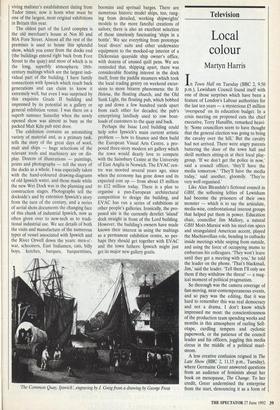Television
Local colour
Martyn Harris
In Town Hall on Tuesday (BBC 2, 9.50 p.m.), Lewisham Council found itself with one of those surprises which have been a feature of London's Labour authorities for the last ten years — a mysterious £5 million 'overspend' on its education budget. In a crisis meeting on proposed cuts the chief executive, Terry Hanalfin, remarked heavi- ly: 'Some councillors seem to have thought that the general election was going to bring the cavalry over the hill.' But the cavalry had not arrived. There were angry parents battering the door of the town hall and shrill mothers sitting-in at their local play- group. 'If we don't get the police in now,' said a council officer, 'they'll have the media tomorrow.' They'll have the media today,' said another, gloomily. 'They're very well organised.'
Like Alan Bleasdale's fictional council in GBH, the softening lefties of Lewisham had become the prisoners of their own monster — which is to say the articulate, media-wise, confrontational interest groups that helped put them in power. Education chair, councillor Jim Mallory, a natural GBH Modt-Marxist with his steel-rim specs and strangulated American accent, played the Machiavellian role, bending to cutbacks inside meetings while sniping from outside, and using the force of occupying mums to embarrass his colleagues. 'They won't leave until they get a meeting with you,' he told the leader on the phone. 'That's blackmail, Jim,' said the leader. 'Tell them I'll only see them if they withdraw the threat' — a mag- ical moment of political pragmatism.
So thorough was the camera coverage of fast-moving, near-contemporaneous events, and so pact' was the editing, that it was hard to remember this was real democracy and not a drama. I don't know which impressed me most: the conscientiousness of the production team spending weeks and months in this atmosphere of curling Sell- otape, curdling tempers and cyclonic paperwork, or the patience of the council leader and his officers, juggling this media circus in the middle of .a political mael- strom.
A less creative confusion reigned in The Late Show (BBC 2, 11.15 p.m., Tuesday), where Germaine Greer answered questions from an audience of feminists about her book on menopause, The Change. To her credit, Greer undermined the enterprise from the start, denouncing it as a form of
media 'mud wrestling'. You put all the women in the ring and hope they cancel each other out. 'Editors love it,' she declared, with an eye on the production gallery, but nobody could have loved what followed.
Her argument, so far as I could gather from the desultory bickering which ensued, was her customary line that women should learn to like themselves for what they are, always providing they can define what that is. The avoidance of menopause and ageing is an aspect of female subservience to men. It is a decent argument if you accept Greer's claim that women are 'totally pow- erless', which I don't, but nobody addressed it.
Lynda La Plante, the TV playwright, thought Germaine had been nasty in her book about role models for ageing women such as Joan Collins and Jane Fonda. Greer said she hadn't been, but then spoiled it by sneering at their shoulder pads (she was wearing a big pair herself, under a very short dress). Wilmette Brown, the silly cow who runs the Kings Cross Collective of Prostitutes, said Greer had ignored blacks and lesbians. Susie Orbach said it was a fractured discussion because menopause was a taboo subject — which, seeing that there is an article about it in the papers most weeks and in women's mags every week, seemed a strange thing to say. Yvonne Roberts made the typically vacu- ous remark, which always concludes such a shambles, that it was really wonderful Ger- maine had written this book so they could all be there to talk about it. Give me Greer on her own next time, and save the mud- wrestling for Sky.



















































 Previous page
Previous page